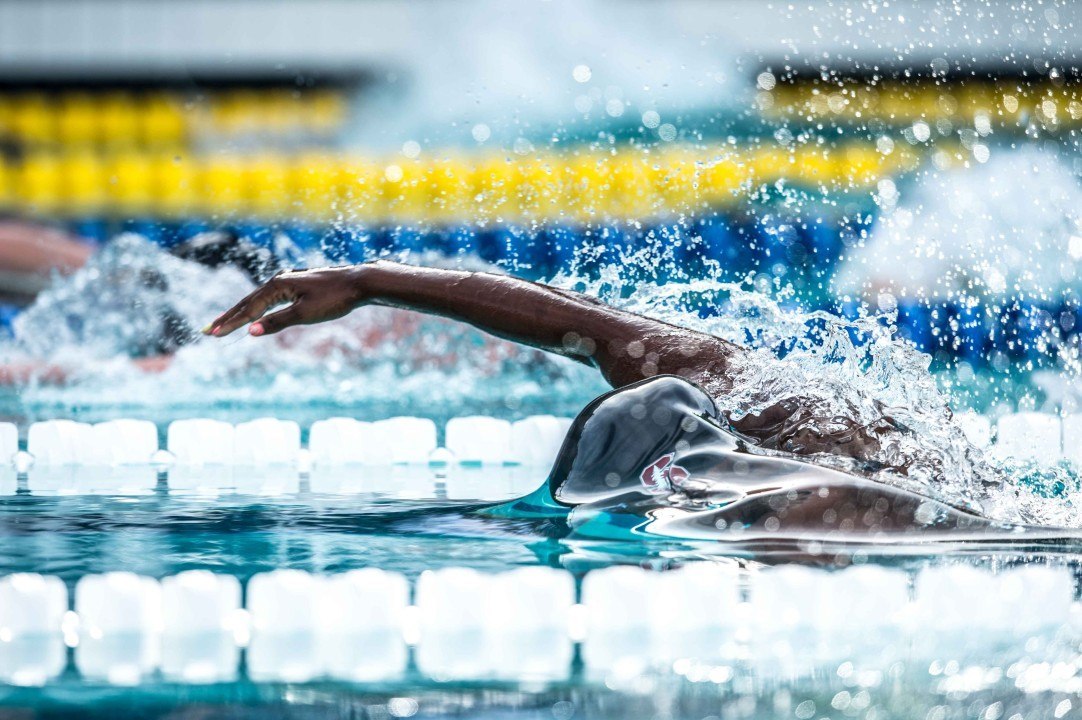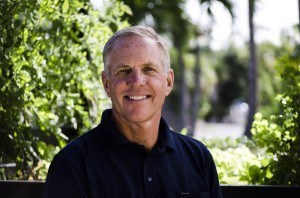Courtesy of Gary Hall Sr., 10-time World Record Holder, 3-time Olympian, 1976 Olympic Games US Flagbearer and The Race Club co-founder.
At The Race Club, our approach to teaching better swimming technique is based largely on physics. Since water is rather unforgiving when it comes to making mistakes, reducing frontal drag of swimmers is of paramount importance. We believe that the correct body position is one of the most important features of our teaching.
I have always felt that the head position is the key focal point in correcting body position. In freestyle, for example, when the head is lowered by looking down, the hips rise to the surface and the body alignment is improved. While most of the swimmers we have taught do not have the correct head position, it is likely due to the habit of swimming defensively in practice when they look forward, keeping an eye out for a wandering swimmer.
CORRECT HEAD POSITION
When the head is in the correct position, looking down, one cannot see where one is going in the lane. We must then trust that everyone else in our lane is swimming on the correct side. Unfortunately, that doesn’t always happen. Once you get smacked in the head by an unwary swimmer wandering over to the wrong side of the lane, you will feel much safer looking forward, hoping to prevent another mishap. Unfortunately, by doing so you will swim more like a barge than a submarine.
Getting the head down is relatively easy for us to do with our swimmers. After a few drills and some practice, they quickly realize that they can swim easier and faster with their heads in the down position. Not only does that technique straighten the body, but it also enables the head to get underwater during the fastest point in the stroke cycle, the so-called surge point. Surface or wave drag, one of the three types of frontal drag slowing a swimmer, is related to the fourth power (Vel4) of the swimmer’s speed. In other words, a swimmer pays a huge penalty for having the head above water at the surge point.
The problem for us isn’t getting the swimmer to put his or her head down. It is in keeping the head down. It is as if the head were made out of cork. Once we get it down, we turn around and look back and it pops right back up again. Old habits are hard to get rid of. Or perhaps we have been focusing on the wrong part of the body in trying to get the correct position.
IMPROVING BODY ALIGNMENT
To improve body alignment, there may be a better way. The typical posture of a swimmer is to have a lot of flexion of the upper back, the thoracic spine (kyphosis), and to have a lot of extension of the lower or lumbar spine (lordosis). Hyperextension of the knees makes this type of posture even more pronounced. The reason for this posture is likely due to the tremendous development of the upper back muscles and the tendency in most strokes to hunch the shoulders forward at certain times and to arch the back at others.
While swimming, most of us tend to take on this same posture; shoulder rounded and back arched. What if instead of focusing on dropping our head down, we concentrate on straightening our lower backs? We can accomplish this while swimming freestyle by simply lifting our stomachs higher in the water. In physical therapy, this posturing is called the Pelvic Tilt. In order to do so, one needs to engage the core muscles and the gluteus muscles. When doing this, the lumbar spine straightens and the head drops down lower in the water. This posture also tends to tighten the kicking motion and increases the effort required on the down kick. More lift is required to hold the body in this higher position in the water and the down kick is a great source of lift.
I have no proof yet that this technique will make a swimmer faster, but while using this technique in practice, I notice that my freestyle kick narrows, I work more on the down kick to hold the position, and that my head lowers automatically; all good things. Perhaps even more important, I feel faster in the water.
I look forward to testing the frontal drag using these two different body positions soon with our Propulsion/Drag Meter and will share with you the results. In the meantime, experiment with your next freestyle set by elevating your stomach in the water, using the pelvic tilt, and straightening your lower back. See what happens. Let me know your thoughts.
Elevated head position is a common mistake made by young swimmers. This week, you can see the difference in speed that three different head positions can make with a ten-year-old freestyler. Subscribe to lanes 2, 3 or 4 for the complete video on head position; https://theraceclub.com/membership/raceclub-subscriptions/
Yours in swimming,
Gary Sr.
Like The Race Club on Facebook
Follow The Race Club on Instagram
Follow The Race Club on Twitter
Connect to The Race Club / Gary Hall Sr. on Linkedin
[email protected]
See The Race Club HQ here.
THE RACE CLUB
 Because Life is Worth Swimming, our mission is to promotes swimming through sport, lifelong enjoyment, and good health benefits. Our objective is for each member of and each participant in The Race Clubto improve his or her swimming performances, health, and self-esteem through our educational programs, services and creativity. We strive to help each member of The Race Club overcome challenges and reach his or her individual life goals.
Because Life is Worth Swimming, our mission is to promotes swimming through sport, lifelong enjoyment, and good health benefits. Our objective is for each member of and each participant in The Race Clubto improve his or her swimming performances, health, and self-esteem through our educational programs, services and creativity. We strive to help each member of The Race Club overcome challenges and reach his or her individual life goals.
The Race Club provides facilities, coaching, training, technical instruction, video, fitness and health programs for swimmers of all ages and abilities. Race Club swim camps are designed and tailored to satisfy each swimmer’s needs, whether one is trying to reach the Olympic Games or simply improve one’s fitness. Our programs are suitable for beginner swimmers, pleasure swimmers, fitness swimmers, USA swimming or YMCA swimmers, or triathletes; anyone who wants to improve swimming skills. All of our Race Club members share an enjoyment of being in the water and use swimming to stimulate a more active mind and body.


Bill Boomer and Richard Quick circa 1990s. Posture line and balance!
I was training with Misty Hyman a couple of weeks ago and this is exactly what she was trying to get me to do. Squeeze the shoulder blades together, flatten the lower back, tilt the pelvis forward and contract the abs. It felt easier to swim in this position. Kick narrowed.
Misty is smart and was a great technician as a swimmer…also had a great technical coach Bob Gillette
“I look forward to testing the frontal drag using these two different body positions soon with our Propulsion/Drag Meter and will share with you the results.”
Gary, I look forward to the results too!
When will you have the results? I’m very excited about these little insights you always share, thank you so much.
I will be in Florida June 9-20 and will plan to do it then.
Coach Hall I am a HUGE fan as you know BUT what if my son is scared to put his face in the water when he swims? I show him old Tarzan movies where he out swims crocodiles and my son has bought into racing head high out of the water! Seriously thank you for your amazing insights!
Very macho of your son! But I will gladly race him (how old is he?) and show him he can’t win that way.